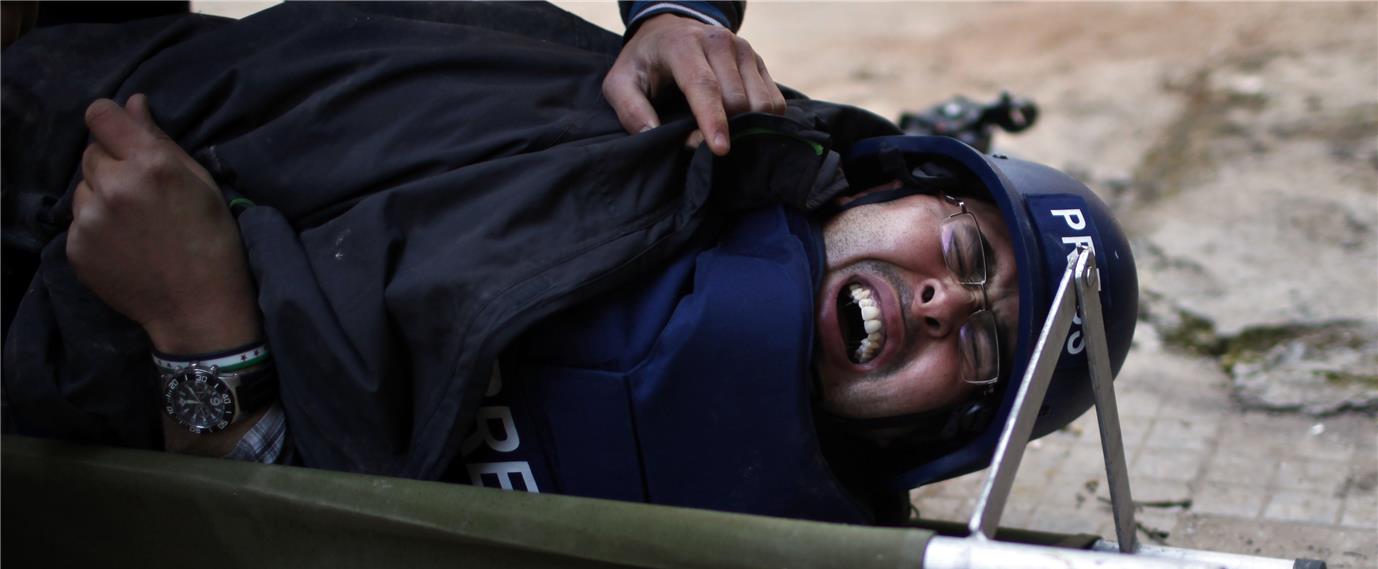يواجه العاملون في مهنة الصحافة في العالم العربي وبكثير من الأماكن التي تشهد اضطرابات أو تلك التي تخضع لحكم الديكتاتوريات، مصاعبَ عديدة تتعلق بجوهر العمل الصحفي، فمقتَلُ صحفي واحد يعني موت شاهدٍ مُحتَمَل على مجموعة من الجرائم أو التجاوزات التي حدَثُت في أماكن النزاع.
التخطيط للمهمة
في هذه السلسلة من المقالات التي تقدِّمها مجلة الصحافة سنستعرض أهمَّ النقاط الأساسية التي يجب على الصحفي أو الصحفية امتلاكها للتقليل من التعرض للمخاطر خلال عملية التغطية، بالطبع لابد من التنويه أن قراءة هذه السلسلة لا تُغني بأي حالٍ من الأحوال عن الخضوع لبرنامج التدريب الخاص بالسلامة المهنية الصحفية الذي تقدِّمه مجموعة من المؤسسات والنقابات الصحفية الوطنية والدولية بمافيها مؤسسة "الجزيرة".
في ظل العنف المتصاعد في أماكن عديدة، على كل عامل في الحقل الصحفي أن يعرف أن السلامة المهنية تقوم على جملة من الإجراءات التي لا تأخذ أكثر من دقائق قليلة تكون كافية بالحد الأدنى للتقليل من المخاطر أو وضعها في مكان المُسَيطَر عليه، فالسلامة المهنية الصحفية تعتمد على جملة من المعارف النظرية والعملية التي يمارسها الصحفي قبل وخلال وبعد المهمة.
اللحظة صِفر
تبدأ أي مهمة صحفية من لحظة التكليف بها من إدارة المؤسسة الإعلامية، فإجراءات السلامة المهنية تبدأ من اللحظة صِفر التي تعني استلام المهمة والشروع بتنفيذها من المقر عبر جملة من الاتصالات التي يجريها الصحفي لترتيب المحاور العامة اللوجيستية، هذه المرحلة يُطلَقُ عليها "مرحلة التخطيط"، وتعتبر من أهم الخطوات في مراحل التحضير لعملية التغطية في مناطق الصراع، فالهدف من التخطيط هو تحقيق أعلى فرص نجاح ممكنة لتنفيذ المهمة. تضع عملية التخطيط كل المخاطر الممكنة أو المتوقعة في الحسبان، فمناطق الصراع أو بؤر الاحتجاجات هي أماكن مفتوحة على كل احتمالات المخاطر وبالتالي لا يُنصَحُ أبداً بالاعتماد على خطة سابقة نفَّذها زميلٌ أو زميلة خلال التغطية في ذات المكان، لعدة أسباب أبرزها أن المخاطر تختلف في فتراتها الزمنية وبحسب تطور الصراع أو شكل الاحتجاج، إضافة إلى أن التعامل مع التطورات المباشرة يعني العمل بشكل مباشر على خطة جديدة تأخذ بالحسبان كل ما سبق، لابد أن يعي الصحفي أنَّ الخطة المُحكَمة تعني إمكانية نجاح أكبر للمهمة، فهي تضع كل المخاطر ممكنة الحدوث في الحسبان، وتمكِّن من رؤية الميدان بوضوح بعد دراسته جغرافياً وتاريخياً بالنسبة لأنواع الصراع والأسلحة والمخاطر الموجودة.
البناء المنطقي
عملية التخطيط تُبنى بشكل منطقي وعقلاني ولا تجنح إلى الخيال والأهداف صعبة التحقيق، فهي تتعامل مع المكان أولاً والأهداف ممكنة التحقيق من التغطية، كما أنها تتعامل مع المهمة على أنها مجموعة من المكونات الصغيرة على ألا تتضمن الكثير من التفاصيل التي تُربِك الفريق، لذلك تنطلق من العموميات إلى الخاص بشكل عقلاني ومنطقي آخذة بالحسبان كل المخاطر الممكنة.
تبدأ عملية التخطيط من البداية إلى النهاية، مع إمكانية قراءَتها بشكل عكسي أو تنفيذها من أي نفطة تتضمنها، في الخطوة الأولى لابد من دراسة شاملة لمكان التغطية أو فضائها الجغرافي. لابد هنا من معرفة التضاريس وظروف الأحوال الجوية وطرق السيارات الرئيسية والأنهار والوديان، واتجاهات المخارج والمداخل الرئيسية مِن وإلى جغرافيا التغطية. الخطوة الثانية تتضمن الاطلاع على شكل الصراع الموجود وتاريخه، هل هو عرقي، طائفي، ديني، عسكري، حزبي؟ فمعرفة هذه التفاصيل تفيد إلى حد بعيد في بناء الخطة الأساسية وتنفيذ التحركات ضمن تحديث هذه المعارف وانتقال جغرافيا الصراع والسيطرة في منطقة التغطية، والإلمام التام بتوزُّع مراكز القوى وفرض السيطرة ونقاط الاشتباك فضلاً عن أنواع الأسلحة الموجودة ومخاطرها وآليات التعامل معها، لضمان الإحاطة بكل هذا يُنصَح بمتابعة كل التقارير والتغطيات الاحترافية وغير الاحترافية التي تأتي من مناطق تنفيذ المهمة، فهذه التقارير تجعل الصحفي على تماس مباشر مع الأحداث في المكان المُتَّجَه إليه.
التخطيط الشامل
في المراحل الأولى من التخطيط يجب تحديد المهمة وأهدافها بشكل دقيق وشامل، و إذا تعذَّر الوصول إلى مكان التغطية لأسباب أمنية، يقعُ على عاتق الصحفي التفكير بقصة بديلة يمكن تنفيذها، بناءً على هذا الطرح تبدأ مرحلة تقدير المهمة المبنية في جوهرها على جملة من التفاصيل تتعلَّق بالأوراق الثبوتية، والمعدات المطلوبة خلال التغطية، والفحوص الطبية. وفي هذا الإطار يجب على كل صحفي يستعد للانطلاق إلى مهمة ميدانية إجراء فحوصات طبية لضمان عدم التعرض لأي مشاكل صحية، عند ضمان كل ما سبق تبدأ دراسة إمكانيات الوصول إلى أقرب نقطة للتغطية قبل الشروع بها.
يُنصح الصحفيون باتخاذ قاعدة ميدانية بعيدة عن مركز المهمة لأنها أقل خطورة من الساحة التي تجري فيها تفاصيل العملية – اختيار المقر سيكون له بحث خاص فيه مستقبلاً-، السؤال الذي يجب على الصحفي الإجابة عليه خلال وضع الخطة هو: ماهي المخاطر التي يمكن أن أُصادِفها؟ وكيف أتعامل معها؟.
المخاطر يمكن وضع إطارها العام، في المواضيع التالية: " القتل، الإصابة، الاختطاف، مصادرة المعدات، الوقوع في فخ ما، السرقة، أحداث العنف، التهديد النفسي"، فإلى جانب الخطة الشاملة يجب على الصحفي أن يأخذ بالحسبان عدم التنقل في الوقت الخطأ، غالباً يكون هذا التوقيت الخاطئ متعلقاً بالتحركات العسكرية أو القصف الجوي.
إذاً، الاطار العام لتخطيط أي مهمة يبدأ من خطوتين: الأولى تحديد المخاطر والتعامل معها، وهذا يتعلق بالمكان والبيئة وظروف المهمة، بينما تكون الخطوة الثانية تحت عنوان "الأمن الذاتي"، وفي هذا التفصيل على الصحفي أن يمتلك المعدات الشخصية الأساسية قبل الانطلاق إلى المهمة، نتحدث هنا عن معدات السلامة المهنية وهي : "الدرع الواقي، الخوذة، القفازات، النظارات، الحقيبة الميدانية، حقيبة الهرب"، سنأتي في وقت لاحق على ذِكر كل هذه التفاصيل وآليات استخدامها.
إن وضع أي خطة ميدانية أو خطة بديلة تتطلب معرفة تامة بجغرافية المكان وطبيعة ساكنيه وبعض عاداتهم، إضافة إلى تحديد النقاط الرئيسية التي يمكن اللجوء إليها في حال حدوث أي طارئ، كالمشافي، النقاط الأمنية، الملاجئ الرسمية أو الأهلية، كما يدخل في هذا الإطار كل الأمور اللوجيستية التي تتعلق بالمهمة، والمقصود من هذا "السيارات، الهواتف المحمولة، الأجهزة الإلكترونية، وغيرها".
الآن بإمكانك الشروع بتحضير الخطة الخاصة بك لتغطية أماكن تشهد صراعات أو اشتباكات، لكن دوماً ضع أمامك أنَّ حياتَك أهم من أي خبر، كن أنت صانع الخبر ولا تكن أنت الخبر!








































